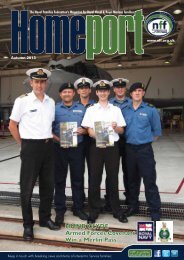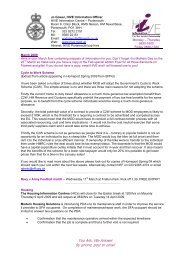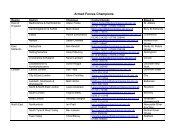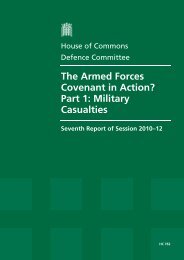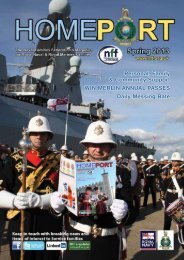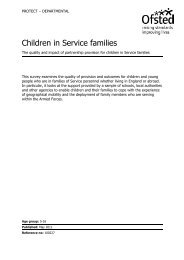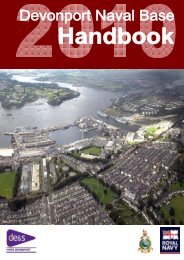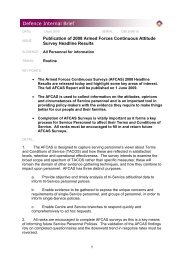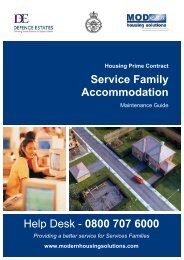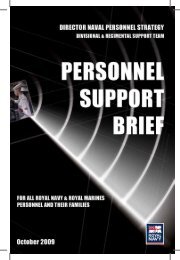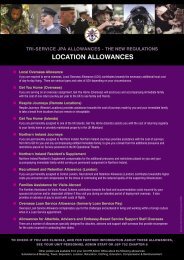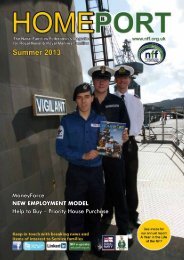Information - NFF
Information - NFF
Information - NFF
You also want an ePaper? Increase the reach of your titles
YUMPU automatically turns print PDFs into web optimized ePapers that Google loves.
News & Views from the <strong>NFF</strong> Chair<br />
home before I leave and really need this<br />
money to go towards the purchase. If not,<br />
will have to move our family from the SFA<br />
we’re living in at the moment into rented<br />
accommodation, then again into our own<br />
home. This all adds to the stress of leaving<br />
the Service, finding a job etc.<br />
A – The Pay & Pension Agency currently states that<br />
payment of terminal benefits and pension will be<br />
paid within 30 days of termination date. Both the<br />
current pension schemes, AFPS75 and AFPS05,<br />
have in their Statutory Instruments the details of<br />
when pension benefits will be paid to members.<br />
AFPS75 states that ‘the pension and the lump sum<br />
become payable immediately on the member<br />
ceasing to be in Service’. AFPS05 states that ‘a<br />
scheme member is entitled to a taxable pension for<br />
life and a pension lump sum if he leaves the Regular<br />
Armed Forces at or beyond normal retirement<br />
age’. The Navy Pay Colonel has approached HM<br />
Treasury in the past to determine if it would be<br />
possible to bring forward this payment to help the<br />
individual’s transition to civilian life easier but the<br />
response has been a clear and unequivocal “No”.<br />
This is because the legislation underpinning both<br />
Pension Schemes dictates that benefits are only<br />
payable on the day of departure from the Service.<br />
Even if such an option was possible it would be<br />
worth bearing in mind that, as the individual is still<br />
serving, such payment would be treated as a benefit<br />
in kind and therefore liable to tax.<br />
The future pension scheme is currently being<br />
designed and there may be scope to allow for more<br />
flexibility over payments. Lord Hutton made the<br />
recommendation that “members should have greater<br />
choice over when to start drawing their pension<br />
benefits”. However, it must be borne in mind that<br />
the HM Treasury position on taxation of benefits in<br />
kind is unlikely to alter, so any change may be limited<br />
and unlikely to result in a pre-retirement lump sum<br />
within the timescales proposed here.<br />
Q – I am living in SSFA (Substitute<br />
Service Families Accommodation) and the<br />
managing agent, HCR, aren’t supporting<br />
me as much as I had hoped. What can I do?<br />
A – Please go back to HCR and explain your<br />
concerns. They are the managing agent and<br />
hold responsibility for ensuring everything runs<br />
smoothly. It may also be worth checking within the<br />
divisional system to see if there is any additional<br />
support from the Chain of Command to help<br />
should the need arise. (This caller did go back to<br />
HCR and is now very happy with the level of support<br />
they are receiving from them.)<br />
Q – My request for a travel warrant for my<br />
wife, whilst I am deployed on Herrick 14,<br />
has been turned down by my Unit Clerk,<br />
because my family live in Poole whilst the<br />
Unit is in Plymouth. Surely the location of<br />
the family isn’t relevant?<br />
A – If you are deployed for over four months<br />
your wife will be entitled to travel to either her<br />
or your parents as per the JSP. (04.1505: Travel<br />
for Immediate Families. Concessionary<br />
Travel for Families (CTF) is provided to enable<br />
the immediate family of Service personnel to<br />
have the benefit of the support of the Service<br />
person’s close family, during extended periods of<br />
deployment by their Service spouse/civil partner.<br />
Eligibility for FTR is created when an Acc (or<br />
INVOLSEP) Service person is deployed from the<br />
UK or from an overseas station to an operational<br />
location, exercise or deployment that attracts the<br />
Deployment Welfare Package (Overseas). This<br />
excludes those in Seagoing Longer Separation<br />
Allowance Qualifying Units who are entitled to use<br />
transferred Get You Home (Seagoers) Warrants.<br />
All Service personnel are eligible for CTF; for<br />
Reserve personnel however this is unlikely to<br />
extend beyond Full Time Reserve Service (Full<br />
Commitment) and mobilised personnel, except<br />
in DILFOR and compassionate circumstances.<br />
The assessment of CTF entitlement from the<br />
permanent duty station in UK or overseas is to be<br />
made at Unit level at the start of the deployment.)<br />
Q – I am Fijian, living here with my<br />
husband and family for the past three years<br />
and I’m wondering if I should apply for an<br />
Indefinite Leave to Remain (ILR) visa. My<br />
current visa doesn’t expire until 2013; do<br />
I have to wait until then to apply or can I<br />
apply now? My husband is currently in the<br />
process of applying for his ILR visa so we<br />
would like to submit the one application<br />
because of costs.<br />
A – As long as your husband is in the Service he<br />
doesn’t need to apply for ILR. He has ‘Service<br />
exempt’ stamped in his passport, so would be<br />
wasting his money in applying for this visa. 28<br />
days before he is due to leave the Service he will<br />
be advised on what he needs to do and then will<br />
need to apply for ILR at that point. Because of that,<br />
as your visa doesn’t expire until 2013 you won’t<br />
need to submit your application until a month<br />
before that end date.<br />
Q – If a serving person is involuntarily or<br />
voluntarily made redundant from the RN<br />
may they subsequently reapply to the RN if<br />
the Service recruits thereafter?<br />
A – Yes they can. The options are – apply Intra<br />
Service/to a shortage branch in the RN or Inter<br />
Service to either RAF or Army. In the redundancy<br />
letter that will be issued, mention will be made of<br />
‘What to do next’ that will encompass such options.<br />
Q – I am married to a Royal Marine. I have<br />
seen a change in his behavior at home and<br />
I need to talk to somebody. I can’t speak<br />
to RM Welfare because I know them. Who<br />
else can I talk to?<br />
A – You don’t have to use RM Welfare. You can<br />
go to NPFS – gave NPFS contact details.<br />
Q – If my friend and I are in exactly the<br />
same job/category and he gets told that he<br />
is being made redundant, but doesn’t want<br />
it, and I do, can we swap?<br />
A – No.<br />
Q – I am due to leave the Service and have<br />
decided to move my family back to our roots<br />
where we own our own home. This means<br />
that my wife will have to leave her job and<br />
is subsequently not entitled to Job Seekers<br />
Allowance as she is voluntarily resigning,<br />
though this is due to Service reasons.<br />
A – The Job Centre Plus Armed Forces Champion<br />
reviewed existing procedural guidance to establish<br />
how Leaving Voluntarily works when someone<br />
makes a claim for Jobseekers Allowance. When a<br />
person states on their JSA claim form that ‘my spouse/<br />
partner got a job somewhere else so I had to leave’<br />
their employer will be sent a form to complete and<br />
the claimant will also be asked to provide further<br />
information around the circumstances of leaving that<br />
job. The claimant may also be asked ‘have they moved<br />
out of the area they were working in beyond daily<br />
travelling?’ All this information will then be sent to a<br />
Decision Maker who will look to see if the claimant<br />
may have ‘just cause’ in their personal or domestic<br />
life for leaving their job. Because the circumstances in<br />
which someone leaves employment are so varied,<br />
the Decision Maker should consider, as a whole,<br />
all the circumstances in which the claimant left<br />
employment. The Armed Forces Champion intranet<br />
site states: ‘Spouses of Service personnel who<br />
leave employment to follow their partner will<br />
have just cause for leaving that employment<br />
provided they did not leave earlier than was<br />
reasonably necessary in order to arrange the<br />
move. This means they should not be precluded<br />
from receiving Jobseeker’s Allowance (JSA) on the<br />
grounds of voluntary unemployment. Each case<br />
should be considered on an individual basis using the<br />
relevant legislation and the information provided by<br />
the person claiming JSA.’<br />
We Love HMS<br />
SOMERSET<br />
For a fabulous<br />
Families Day<br />
HOMEPORT AUTUMN 2011 5



